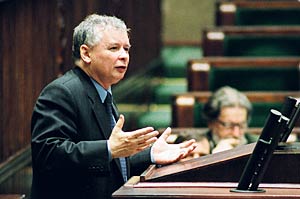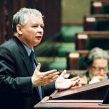
RUSSIA UNEASY ABOUT POLAND’S RIGHTWARD SHIFT
Publication: Eurasia Daily Monitor Volume: 2 Issue: 182
By:

Russia’s political class is warily eyeing the government in Poland, where two center-right parties won the September 25 parliamentary elections. As relations between Moscow and Warsaw, never particularly warm, have sunk to new lows this year, the Kremlin is concerned with the possible impact of Poland’s rightward shift on bilateral ties as well as on relations between Russia and the European Union.
Most Russian analysts agree that the domination of the conservative Law and Justice Party and the liberal Civic Platform in Poland’s legislature does not bode well for the already uneasy Russian-Polish relationship. (The two parties are also fielding the most popular candidates in the country’s presidential poll scheduled for October 9.) Moscow appears to be utterly displeased with the two parties’ nationalist rhetoric and their declared intent to pursue a more muscular policy toward Warsaw’s neighbors. As one Russian specialist on Eastern Europe noted in his commentary, the most prominent feature of the political forces that are about to form the new Polish government is their “pathological dislike of Russia.”
Jaroslaw Kaczynski, leader of the Law and Justice Party, was quick to confirm this unflattering characterization when he recently compared, in an interview with the Polish daily Gazeta Wyborcza, Russian President Vladimir Putin’s Russia with Hitler’s Germany when referring to the methods used to incite the recent assaults on Polish diplomats in Moscow. Kaczynski, who will likely become Poland’s new prime minister, sounded equally defiant when he forcefully stressed Warsaw’s resolve to stand up to its giant eastern neighbor. “Russia needs to accept that Poland is an independent player in this part of Europe and no doubt this will be a long and difficult process,” he said.
The Kremlin has been traditionally annoyed by Poland’s exceptionally warm ties with the United States and Warsaw’s vociferous criticism of Russia’s ruthless prosecution of the war in Chechnya. (One recent Russian commentary points out that Lech Kaczynski, Jaroslaw’s twin brother, mayor of Warsaw, and a presidential hopeful, made several symbolic gestures in support of Chechen separatist fighters. He renamed one of the Polish capital’s streets after Jokar Dudaev, Chechnya’s first president, and publicly denounced the killing of Aslan Maskhadov, the Chechen leader elected president in 1997, as “Moscow’s bloody crime.”) Poland’s energetic support for Ukraine’s Orange Revolution and the practically undisguised backing of the democratic Belarusian opposition seeking to topple that country’s autocratic ruler, Alexander Lukashenka, strained Russian-Polish ties even further. And on top of all that, Warsaw is exhibiting a grand ambition to influence EU foreign policy, in particular, its “eastern” dimension.
As Russia prepares to deal with the pugnacious newly elected leadership of its former vassal state, the Kremlin pundits debate possible strategies. Russian nationalist-minded experts argue that the best way to deal with the Russophobic Polish nationalists is to continue interacting with Russia’s traditional partners in the “old” West over the Poles’ heads. One of the most successful examples of such policy, they say, is the recent Russian-German decision to build a gas pipeline from Russia to Germany via the Baltic, thus bypassing Poland. This approach is exactly what irks the Poles, who have long complained that Moscow refuses to consider them as an equal partner, traditionally seeing Poland as an object of Russia’s policies rather than a full-blown international actor. It is no wonder that the Polish political class was incensed by the Northern Europe gas pipeline project, and Lech Kaczynski has already announced that the new government would do what it can to block its realization.
In fact, Russian strategists hope that the new Polish leadership’s “extremist attitudes” will eventually undermine Warsaw’s claims to play a key role in shaping the joint EU policy toward the bloc’s eastern neighbors.
Thus it is unlikely, some analysts suggest, that the bellicose and ultra-nationalist noises coming out of Warsaw these days will be positively received by Western Europe’s big powers inclined to seek accommodation with Moscow rather than unnecessarily tease the Russian bear. Remarkably, not a small number of Polish foreign-policy specialists are aware of this, although they are, naturally, somewhat annoyed by the reluctance of their EU partners to understand the Polish perspective. “It’s very difficult for us to accept that the policy to appease Russia is the best way of getting democratization,” the foreign editor of Przekroj magazine told the Times, clearly implying that Western Europeans would rather snuggle up to the Russians.
The Kremlin also counts on the unwillingness of many EU diplomats in Brussels to support Poland’s bold revolutionary designs aimed at regime change in Belarus. Symptomatically, several Russian observers positively commented on the recent pronouncements by Lech Walesa, the former Polish president, who suggested that that the pro-democracy movements in former Soviet republics should move cautiously. He also spoke against provoking Russia by an over-ambitious desire to establish democratic governments on its borderlands, be it in Belarus, Moldova, or Central Asia.
Interestingly, Russian media have missed the fact that Walesa received support from Zbigniew Brzezinski, who usually tends to be demonized by Moscow commentators as the principal mastermind of the “color revolutions.” Yet Brzezinski argues that revolutions have to be sparked from within, not transplanted from the West. “Building democracy as an imposition from abroad is a form of imperialism,” he contends.
Finally, Russian analysts note that among the supporters of the Law and Justice Party – likely, the senior partner in the coalition government – there are many Euroskeptics. The argument is that the Polish conservatives’ further disillusionment with European integration may push them toward closer economic cooperation with Russia, which will eventually help Warsaw build a more realistic “eastern” policy.
(Nezavisimaya gazeta, September 27, 28; Izvestiya, GlobalRus.ru, September 27; Novye izvestiya, Politcom.ru, September 26; Reuters, AP, Kreml.org, Times, September 23; Literaturnaya gazeta, September 21)




